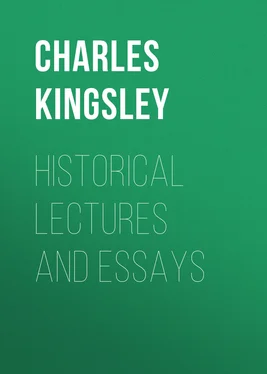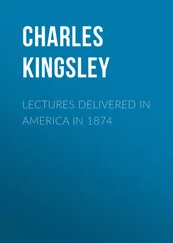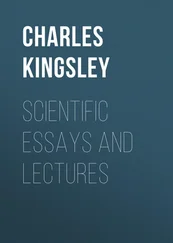Charles Kingsley - Historical Lectures and Essays
Здесь есть возможность читать онлайн «Charles Kingsley - Historical Lectures and Essays» — ознакомительный отрывок электронной книги совершенно бесплатно, а после прочтения отрывка купить полную версию. В некоторых случаях можно слушать аудио, скачать через торрент в формате fb2 и присутствует краткое содержание. Жанр: foreign_prose, История, foreign_edu, foreign_antique, на английском языке. Описание произведения, (предисловие) а так же отзывы посетителей доступны на портале библиотеки ЛибКат.
- Название:Historical Lectures and Essays
- Автор:
- Жанр:
- Год:неизвестен
- ISBN:нет данных
- Рейтинг книги:5 / 5. Голосов: 1
-
Избранное:Добавить в избранное
- Отзывы:
-
Ваша оценка:
- 100
- 1
- 2
- 3
- 4
- 5
Historical Lectures and Essays: краткое содержание, описание и аннотация
Предлагаем к чтению аннотацию, описание, краткое содержание или предисловие (зависит от того, что написал сам автор книги «Historical Lectures and Essays»). Если вы не нашли необходимую информацию о книге — напишите в комментариях, мы постараемся отыскать её.
Historical Lectures and Essays — читать онлайн ознакомительный отрывок
Ниже представлен текст книги, разбитый по страницам. Система сохранения места последней прочитанной страницы, позволяет с удобством читать онлайн бесплатно книгу «Historical Lectures and Essays», без необходимости каждый раз заново искать на чём Вы остановились. Поставьте закладку, и сможете в любой момент перейти на страницу, на которой закончили чтение.
Интервал:
Закладка:
He needed no sacrifices of blood. He was to be worshipped only with prayers, with offerings of the inspiring juice of the now unknown herb Homa, and by the preservation of the sacred fire, which, understand, was not he, but the symbol—as was light and the sun—of the good spirit—of Ahura Mazda. They had no images of the gods, these old Persians; no temples, no altars, so says Herodotus, and considered the use of them a sign of folly. They were, as has been well said of them, the Puritans of the old world. When they descended from their mountain fastnesses, they became the iconoclasts of the old world; and the later Isaiah, out of the depths of national shame, captivity, and exile, saw in them brother-spirits, the chosen of the Lord, whose hero Cyrus, the Lord was holding by His right hand, till all the foul superstitions and foul effeminacies of the rotten Semitic peoples of the East, and even of Egypt itself, should be crushed, though, alas! only for awhile, by men who felt that they had a commission from the God of light and truth and purity, to sweep out all that with the besom of destruction.
But that was a later inspiration. In earlier, and it may be happier, times the duty of the good man was to strive against all evil, disorder, uselessness, incompetence in their more simple forms. “He therefore is a holy man,” says Ormuzd in the Zend-avesta, “who has built a dwelling on the earth, in which he maintains fire, cattle, his wife, his children, and flocks and herds; he who makes the earth produce barley, he who cultivates the fruits of the soil, cultivates purity; he advances the law of Ahura Mazda as much as if he had offered a hundred sacrifices.”
To reclaim the waste, to till the land, to make a corner of the earth better than they found it, was to these men to rescue a bit of Ormuzd’s world out of the usurped dominion of Ahriman; to rescue it from the spirit of evil and disorder for its rightful owner, the Spirit of Order and of Good.
For they believed in an evil spirit, these old Persians. Evil was not for them a lower form of good. With their intense sense of the difference between right and wrong it could be nothing less than hateful; to be attacked, exterminated, as a personal enemy, till it became to them at last impersonate and a person.
Zarathustra, the mystery of evil, weighed heavily on them and on their great prophet, Zoroaster—splendour of gold, as I am told his name signifies—who lived, no man knows clearly when or clearly where, but who lived and lives for ever, for his works follow him. He, too, tried to solve for his people the mystery of evil; and if he did not succeed, who has succeeded yet? Warring against Ormuzd, Ahura Mazda, was Ahriman, Angra Mainyus, literally the being of an evil mind, the ill-conditioned being. He was labouring perpetually to spoil the good work of Ormuzd alike in nature and in man. He was the cause of the fall of man, the tempter, the author of misery and death; he was eternal and uncreate as Ormuzd was. But that, perhaps, was a corruption of the purer and older Zoroastrian creed. With it, if Ahriman were eternal in the past, he would not be eternal in the future. Somehow, somewhen, somewhere, in the day when three prophets—the increasing light, the increasing truth, and the existing truth—should arise and give to mankind the last three books of the Zend-avesta, and convert all mankind to the pure creed, then evil should be conquered, the creation become pure again, and Ahriman vanish for ever; and, meanwhile, every good man was to fight valiantly for Ormuzd, his true lord, against Ahriman and all his works.
Men who held such a creed, and could speak truth and draw the bow, what might they not do when the hour and the man arrived? They were not a big nation. No; but they were a great nation, even while they were eating barley-bread and paying tribute to their conquerors the Medes, in the sterile valleys of Farsistan.
And at last the hour and the man came. The story is half legendary—differently told by different authors. Herodotus has one tale, Xenophon another. The first, at least, had ample means of information. Astyages is the old shah of the Median Empire, then at the height of its seeming might and splendour and effeminacy. He has married his daughter, the Princess Mandane, to Cambyses, seemingly a vassal-king or prince of the pure Persian blood. One night the old man is troubled with a dream. He sees a vine spring from his daughter, which overshadows all Asia. He sends for the Magi to interpret; and they tell him that Mandane will have a son who will reign in his stead. Having sons of his own, and fearing for the succession, he sends for Mandane, and, when her child is born, gives it to Harpagus, one of his courtiers, to be slain. The courtier relents, and hands it over to a herdsman, to be exposed on the mountains. The herdsman relents in turn, and bring the babe up as his own child.
When the boy, who goes by the name of Agradates, is grown, he is at play with the other herdboys, and they choose him for a mimic king. Some he makes his guards, some he bids build houses, some carry his messages. The son of a Mede of rank refuses, and Agradates has him seized by his guards and chastised with the whip. The ancestral instincts of command and discipline are showing early in the lad.
The young gentleman complains to his father, the father to the old king, who of course sends for the herdsman and his boy. The boy answers in a tone so exactly like that in which Xenophon’s Cyrus would have answered, that I must believe that both Xenophon’s Cyrus and Herodotus’s Cyrus (like Xenophon’s Socrates and Plato’s Socrates) are real pictures of a real character; and that Herodotus’s story, though Xenophon says nothing of it, is true.
He has done nothing, the noble boy says, but what was just. He had been chosen king in play, because the boys thought him most fit. The boy whom he had chastised was one of those who chose him. All the rest obeyed: but he would not, till at last he got his due reward. “If I deserve punishment for that,” says the boy, “I am ready to submit.”
The old king looks keenly and wonderingly at the young king, whose features seem somewhat like his own. Likely enough in those days, when an Iranian noble or prince would have a quite different cast of complexion and of face from a Turanian herdsman. A suspicion crosses him; and by threats of torture he gets the truth from the trembling herdsman.
To the poor wretch’s rapture the old king lets him go unharmed. He has a more exquisite revenge to take, and sends for Harpagus, who likewise confessed the truth. The wily old tyrant has naught but gentle words. It is best as it is. He has been very sorry himself for the child, and Mandane’s reproaches had gone to his heart. “Let Harpagus go home and send his son to be a companion to the new-found prince. To-night there will be great sacrifices in honour of the child’s safety, and Harpagus is to be a guest at the banquet.”
Harpagus comes; and after eating his fill, is asked how he likes the king’s meat? He gives the usual answer; and a covered basket is put before him, out of which he is to take—in Median fashion—what he likes. He finds in it the head and hands and feet of his own son. Like a true Eastern he shows no signs of horror. The king asks him if he knew what flesh he had been eating. He answers that he knew perfectly. That whatever the king did pleased him.
Like an Eastern courtier, he knew how to dissemble, but not to forgive, and bided his time. The Magi, to their credit, told Astyages that his dream had been fulfilled, that Cyrus—as we must now call the foundling prince—had fulfilled it by becoming a king in play, and the boy is let to go back to his father and his hardy Persian life. But Harpagus does not leave him alone, nor perhaps, do his own thoughts. He has wrongs to avenge on his grandfather. And it seems not altogether impossible to the young mountaineer.
Читать дальшеИнтервал:
Закладка:
Похожие книги на «Historical Lectures and Essays»
Представляем Вашему вниманию похожие книги на «Historical Lectures and Essays» списком для выбора. Мы отобрали схожую по названию и смыслу литературу в надежде предоставить читателям больше вариантов отыскать новые, интересные, ещё непрочитанные произведения.
Обсуждение, отзывы о книге «Historical Lectures and Essays» и просто собственные мнения читателей. Оставьте ваши комментарии, напишите, что Вы думаете о произведении, его смысле или главных героях. Укажите что конкретно понравилось, а что нет, и почему Вы так считаете.












